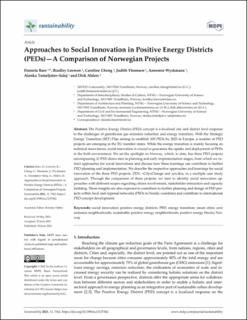| dc.contributor.author | Baer, Daniela | |
| dc.contributor.author | Loewen, Bradley | |
| dc.contributor.author | Cheng, Caroline Y | |
| dc.contributor.author | Thomsen, Judith | |
| dc.contributor.author | Wyckmans, Annemie | |
| dc.contributor.author | Temeljotov Salaj, Alenka | |
| dc.contributor.author | Ahlers, Dirk | |
| dc.date.accessioned | 2021-07-09T10:46:02Z | |
| dc.date.available | 2021-07-09T10:46:02Z | |
| dc.date.created | 2021-07-01T11:51:22Z | |
| dc.date.issued | 2021 | |
| dc.identifier.citation | Sustainability. 2021, 13 (13), . | en_US |
| dc.identifier.issn | 2071-1050 | |
| dc.identifier.uri | https://hdl.handle.net/11250/2764029 | |
| dc.description.abstract | The Positive Energy District (PED) concept is a localized city and district level response to the challenges of greenhouse gas emission reduction and energy transition. With the Strategic Energy Transition (SET) Plan aiming to establish 100 PEDs by 2025 in Europe, a number of PED projects are emerging in the EU member states. While the energy transition is mainly focusing on technical innovations, social innovation is crucial to guarantee the uptake and deployment of PEDs in the built environment. We set the spotlight on Norway, which, to date, has three PED projects encompassing 12 PED demo sites in planning and early implementation stages, from which we extract approaches for social innovations and discuss how these learnings can contribute to further PED planning and implementation. We describe the respective approaches and learnings for social innovation of the three PED projects, ZEN, +CityxChange and syn.ikia, in a multiple case study approach. Through the comparison of these projects, we start to identify social innovation approaches with different scopes regarding citizen involvement, stakeholder interaction and capacity building. These insights are also expected to contribute to further planning and design of PED projects within local and regional networks (PEDs in Nordic countries) and contribute to international PED concept development. | en_US |
| dc.language.iso | eng | en_US |
| dc.publisher | MDPI | en_US |
| dc.rights | Navngivelse 4.0 Internasjonal | * |
| dc.rights.uri | http://creativecommons.org/licenses/by/4.0/deed.no | * |
| dc.title | Approaches to Social Innovation in Positive Energy Districts (PEDs)—A Comparison of Norwegian Projects | en_US |
| dc.type | Peer reviewed | en_US |
| dc.type | Journal article | en_US |
| dc.description.version | publishedVersion | en_US |
| dc.source.pagenumber | 22 | en_US |
| dc.source.volume | 13 | en_US |
| dc.source.journal | Sustainability | en_US |
| dc.source.issue | 13 | en_US |
| dc.identifier.doi | 10.3390/su13137362 | |
| dc.identifier.cristin | 1919805 | |
| dc.relation.project | EC/H2020/824260 | en_US |
| dc.relation.project | EC/H2020/841850 | en_US |
| dc.relation.project | Norges forskningsråd: 257660 | en_US |
| dc.description.localcode | This is an open access article distributed under the Creative Commons Attribution License which permits unrestricted use, distribution, and reproduction in any medium, provided the original work is properly cited | en_US |
| cristin.ispublished | true | |
| cristin.fulltext | original | |
| cristin.fulltext | original | |
| cristin.qualitycode | 1 | |

